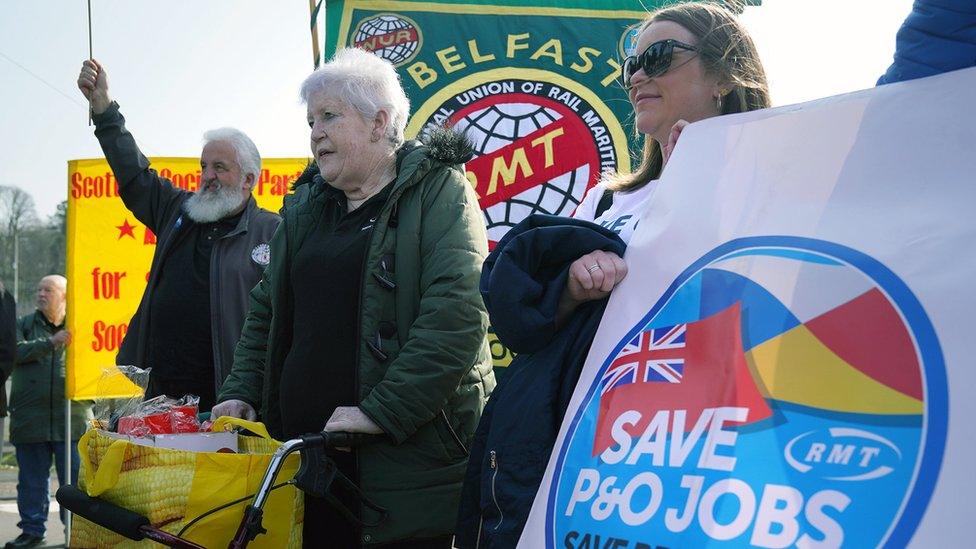STUC conference: What about the workers?
- Published
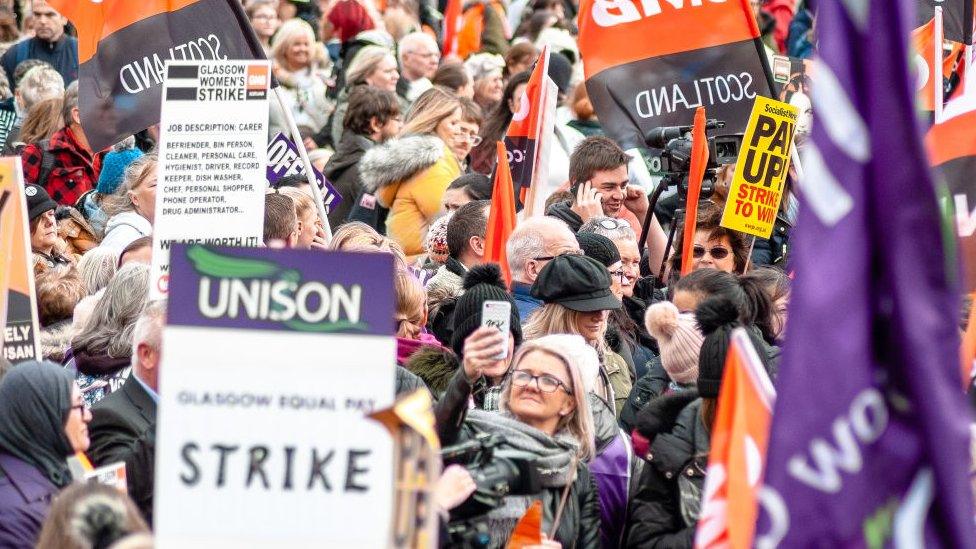
The Scottish Trades Union Congress has its 125th conference this week with a strong negotiating hand but weakness in membership and legal powers, highlighted by the sackings at P&O Ferries.
The failure of pay increases to keep pace with prices, and in a tight labour market, means new dynamics to industrial relations and the prospect of more conflict with employers.
Much of the economy is not covered by union negotiations, particularly affecting young people with informal contracts - just one of the issues that unions want to press home with the Scottish government.
If you're a truck driver or financier, you probably have more spending power than you did last year. If you're not, then you probably don't.
The first group seized the opportunity of the shortage of drivers to demand higher pay, and rises came in around 12%.
In the finance sector, it's been a good year for trading activity and profits, so with bonuses, pay is up 9.8%.
For others, the average pay increase in the past year, without bonuses, is 4%. In the public sector, it's only 1.9%.
Price inflation, meanwhile, has reached 7%, and it's rising. Domestic energy bills will see it spike this month, but it won't fall in a hurry.
Few people in the workforce have ever seen a squeeze on their spending power like this. Inflation in the 1970s led to a spiral of wage demands, in which unions with the most clout were able to drive up pay, thus fuelling price increases to a peak of 25%.
It became the dominant theme of politics in the late 1970s and shaped the following decade of Thatcherism, with its twin themes of squeezing inflation hard and curbing trade union clout.
This came with a sharp increase in unemployment, particularly in older, traditional, heavy industries. Along with legislation to emasculate the ability of unions to mount strike action, that left the unions much weaker and smaller.
Ferries docked
Forty or so years later, inflation has returned but unemployment has not. Brexit has removed the ability of employers to recruit from the European Union.
So this ought to be a bumper opportunity for trade unions to press the case for higher pay. And with a very tight labour market, they can throw in demands for fewer, more flexible hours, better pensions and the right to work from home.
That might be the theory. It's not working out that way. The Scottish Trades Union Congress meets in Aberdeen this week for its 125th annual conference, and its agenda does not have a triumphalist tone.
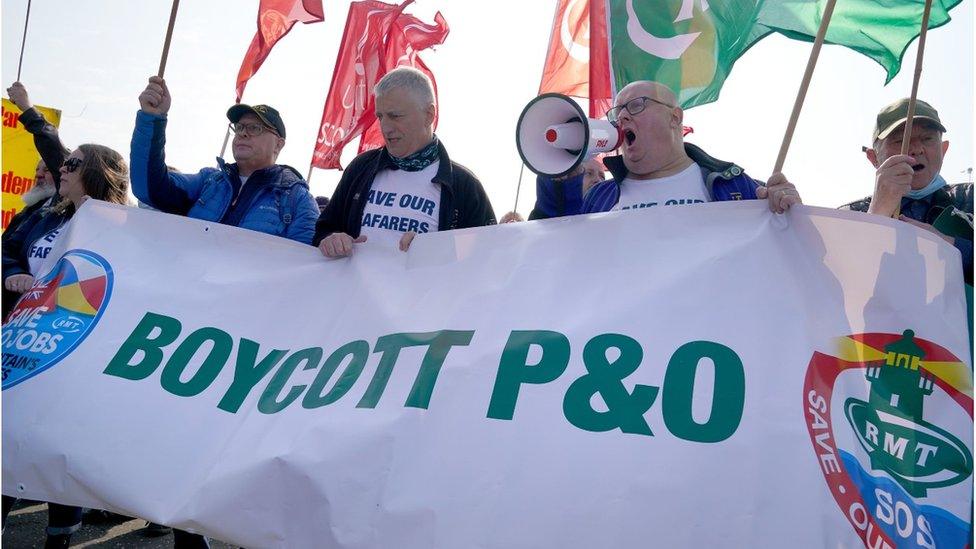
P&O refused to negotiate with the unions, instead sacking workers and hiring agency staff
Instead, it meets in the wake of those 800 sackings at P&O Ferries, in which employers calculated there was no point in negotiating with the RMT transport workers' union, and they would take the hit of breaking the law on consultation with staff.
Perhaps to the company's surprise, the Conservative government has sided with public opinion and the workers.
Whitehall may find it more difficult to handle strike action by the RMT in Network Rail. Governments, including the Scottish one, are taking over privately-run franchises and becoming employers in a sector where unions dig in on crewing levels and ticket office staffing, while services are struggling to recover from the pandemic.
Strife on the rise
The STUC meets as unions face pay fights on numerous fronts: negotiating has become so decentralised that much of it has to be done by inexperienced local officials and shop stewards.
University teachers are fighting four battles in one; pensions, pay, hours and temporary contracts. They're not making much progress, but likely to focus their attention on the exam season, which is when they have some leverage.
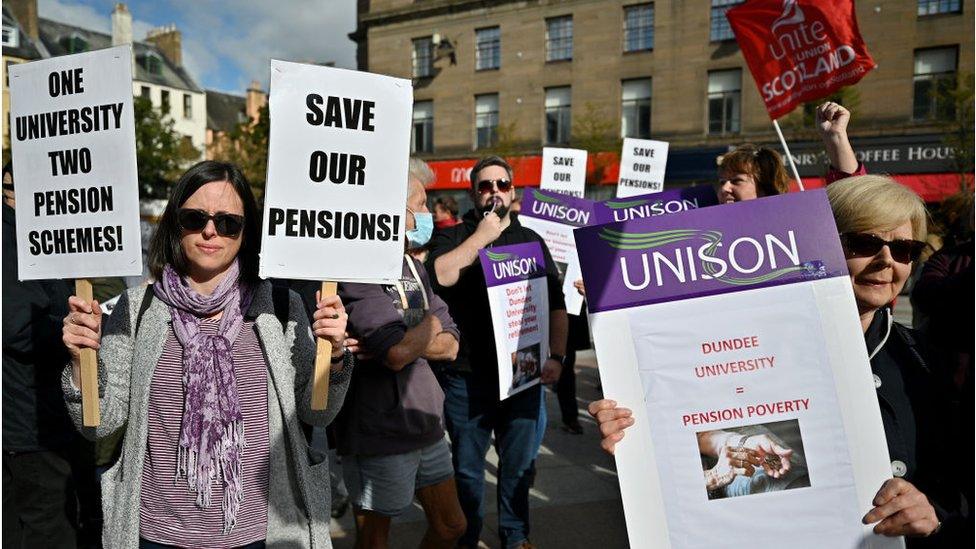
University staff pensions are among issues continuing to cause strife
In Scotland, ballots of teachers and local authority workers have rejected pay offers well below the rate of price inflation. And while it is easy each year to speculate on the possibility of strikes, the loss of real spending power and the stresses emerging out of the pandemic make them seem a bit more likely this time.
Unions also face internal strife and pressures. New general secretaries at Unite and the GMB - the latter is former Scottish organiser Gary Smith - are keen to make their mark.
Professor Gregor Gall, a university researcher into unions at Glasgow University, suggests some of the bigger claims of campaign success need to be viewed with caution. Industrial action was failing away before the Office for National Statistics stopped counting days lost to strikes, but it has recently picked up.
And while Unison, the dominant voice of health service staff, would appear to have a strong case to take to employers in the wake of the pandemic, Gall says it is being weakened by internal tussling.
There are successes for union members to celebrate, and a notable one comes through smart use of the law in Glasgow.
By making the case that mainly women care and cleaning staff are doing work of equal value to mainly male bin collectors, the city council has been forced to pay more than £500m in catch-up pay and to regrade the women's work.
With a similar case in Birmingham, this has implications far beyond these two cities, and one of them is in the way unions operate. By campaigning to drive pay up in a small, specific sector such as rubbish collection, where there are labour shortages, they can set benchmarks and follow up for other workers with use of equal pay law.
Who cares?
The motions for consideration (and probable acclamation) at the STUC today are around public sector pay, with equal rights, followed this afternoon by the challenges in the health and care services.
The National Care Service (NCS) being set up by the Scottish government is seen as an opportunity to address some of the worst pay and conditions in public services.
Local authorities fund most residential care places on the assumption that private providers will pay little more than minimum wage and the minimum level of pension, while funding their own care homes more generously.

The issue of pay in the social care sector is on the agenda
According to Linda Somerville, STUC deputy general secretary, the outline shape of the National Care Service is not like the National Health Service, even if it is intended to command a similar level of public support.
It is not about providing services at the point of need through employing people, but about commissioning services from a range of providers.
And unless low pay and conditions in the current system are addressed, the NCS won't improve the lot of those on the front line, and the system itself will struggle. That is becoming a key issue for unions and for the NCS.
Boss power
The public sector dominates at least the first day of the Congress because it dominates unions. Membership in the public sector runs at more than 50%.
Yet while unions can point to success in some campaigns, more than half of local authority employees in Scotland are earning less than £25,000.
In the private sector, membership is below 17% of the workforce. That part is dominated by sectors that used to be in the public sector, such as buses, trains, power companies and colleges. The oil and gas sector also has a union presence, and it wants to be heard in Aberdeen this week in slowing the pace of the transition to greener energy.
Gregor Gall says that private sector employers can see the case for higher pay, but they come out of the pandemic in many different states of financial health:
"There are employers who saw reductions in business revenue. They are more likely to use "fire and rehire" or to play hardball. Where firms have not been as affected by Covid, and Brexit was not the knock-out blow they feared, they're being more positive."
In new sectors, unions struggle to recruit, particularly among younger workers. In the US, where non-union plants are common, that is being challenged, through hotly-contested votes of Amazon warehouse workers, and with Apple now finding growing pressure to recognise organised labour.
Melanie Simms, professor of work and employment at Glasgow University, says that as young people typically move on from less formal retail and hospitality jobs, they are as likely as any age group to be union members in the sectors with higher membership reach. That is true across countries.

Many workers in the so-called gig economy are unlikely to be unionised
Until then, their experience of the gig economy, she says, is far beyond the understanding of older workers in professional jobs, where the workplace agenda is more likely to be about shifting to a four-day week without loss of pay, and about flexible working from home.
"The likelihood that you would want to negotiate for lower hours is not high," she understates. "A four-hour day without loss of pay would require a big bump to your hourly pay.
"Tight labour markets can help but they're transient and fleeting. They don't last that long, and governments can change migration policy to get a stronger supply of labour."
Older professional workers are only becoming aware of this when their kids join the labour market, says Simms, and some of them can be stunned by what is required: "Being rung at 6 o'clock at night to turn up at 6.30.
"It doesn't take much to look like a really good employer. If you're getting four-week advance notice of shifts, that looks like gold standard.
"Employers consult and engage, but the structure of capital is strongly against that, if your employer is owned by a large corporate or private equity, or you've got plants incentivised to compete with each other."
Where unions are highly regulated by laws introduced in the past 40 years, employment law is far less regulated, says the employment expert: "The boss just has more power."
Economic transformation
She is in favour of a shift to a system familiar to Germans, in which sectoral pay deals take their lead from one employer or plant, and negotiate on the differing conditions and profitability in other cases.
But while there isn't the negotiating structure, or any legal enforcement, that seems unlikely under a Conservative administration at Westminster. Labour is looking at it, however, and the STUC can be expected to add momentum to the idea during this week.
Scottish Labour leader Anas Sarwar speaks to the STUC conference on Tuesday.
It will hear from Nicola Sturgeon today. In recent years, that relationship with St Andrew's House has worked well. Less so now.
The organisation's general secretary, Roz Foyers, played a part in drawing up the Scottish government's new "strategy for economic transformation", but attacked it as it was published for failing to take a more radical approach to changing the way the labour market works.
From running railways, shaping the National Care Service to health service pressures, plus levels of funding for local council social work and teacher pay, When trade unions and the Scottish government meet, they have a full and increasingly difficult agenda.
Related topics
- Published28 February 2022
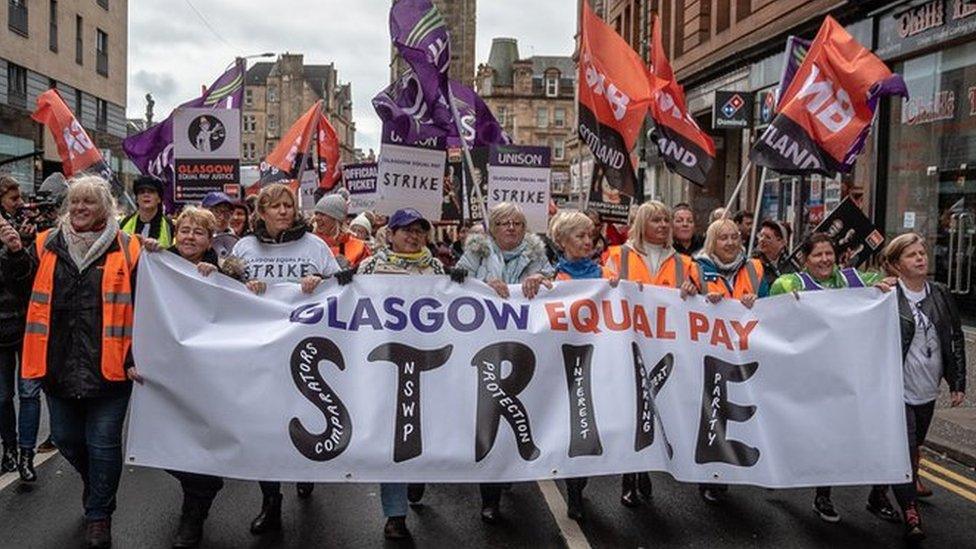
- Published10 April 2022
